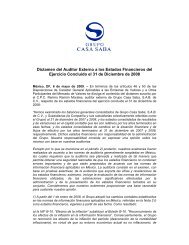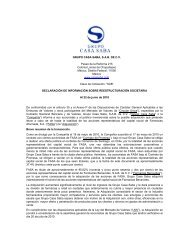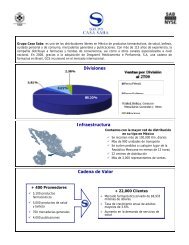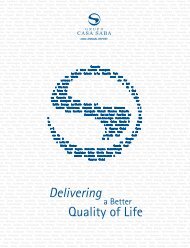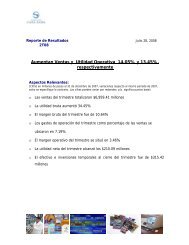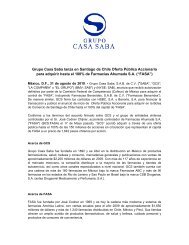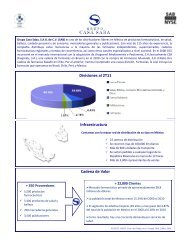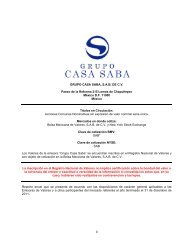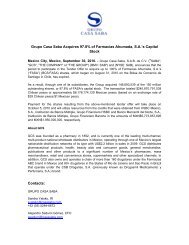FORM 20-F Grupo Casa Saba, S.A.B. de C.V.
FORM 20-F Grupo Casa Saba, S.A.B. de C.V.
FORM 20-F Grupo Casa Saba, S.A.B. de C.V.
Create successful ePaper yourself
Turn your PDF publications into a flip-book with our unique Google optimized e-Paper software.
Table of Contents<br />
Payments and Collections<br />
Most of our distribution sales are ma<strong>de</strong> on credit, with customers signing promissory notes for each invoice indicating the <strong>de</strong>livery of a product. Cash-on-<strong>de</strong>livery<br />
terms are mainly used with new clients or those whose credit has been temporarily suspen<strong>de</strong>d. We negotiate the number of days of credit that we will extend to our clients on a caseby-case<br />
basis. The <strong>de</strong>termination of the number of days that we will extend credit to a particular client <strong>de</strong>pends on a number of factors, including the client’s creditworthiness, as well as<br />
the length and nature of the client’s relationship with us. The <strong>de</strong>termination of the number of days that we will extend credit to a particular client also <strong>de</strong>pends on our current business<br />
strategy. For example, in connection with our efforts to increase sales to particular sectors of the market, in some cases we extend credit to clients in these sectors on more favorable<br />
terms than those offered to our overall client base and, as a result, the maturity of accounts receivable due from clients in these sectors increases slightly. We are constantly adapting<br />
our collection methods to market and general economic conditions. The average maturity of accounts receivable due from our overall client base was 63 days in <strong>20</strong>09, 73 days in <strong>20</strong>10<br />
and 51 days in <strong>20</strong>11.<br />
Although we are continuously seeking to reduce the average maturity of our accounts receivable and maintain an aggressive collection policy for <strong>de</strong>linquent<br />
accounts receivable in conjunction with our efforts to improve our financial results and the efficiency of our operations, we could, in the future, <strong>de</strong>ci<strong>de</strong> to extend credit to clients in<br />
particular sectors on more favorable terms than those offered to our overall client base.<br />
The following chart sets forth the average contracted maturity of accounts receivable due from various types of clients.<br />
Credit<br />
Days<br />
terms<br />
Pharmacies 50<br />
Supermarkets and local wholesalers 60<br />
Government 100<br />
Publications to wholesalers 60<br />
Publications to retailers (1) 60<br />
(1) National retail chains are centralized<br />
Purchasing<br />
We or<strong>de</strong>r all of our products for the distribution business on an ongoing basis, negotiating quantity and price periodically, rather than committing to contractual<br />
terms. While the majority of our suppliers are Mexican companies, we do purchase some products from international manufacturers. We negotiate exchange risks by purchasing these<br />
products in Pesos or setting a limit on our exchange risk exposure.<br />
In previous years, each of our distribution centers placed its own or<strong>de</strong>rs on a weekly basis, directly to suppliers. These or<strong>de</strong>rs were placed through our computerized<br />
or<strong>de</strong>r system, Electronic Document Interchange, or EDI, which we have implemented to communicate efficiently with clients and suppliers through a platform supporting different<br />
electronic communication protocols. Suppliers <strong>de</strong>livered or<strong>de</strong>rs directly to the distribution warehouse that placed the or<strong>de</strong>r, or to our transportation subsidiary, Marproa. Suppliers<br />
typically <strong>de</strong>livered bulk or<strong>de</strong>rs directly to the distribution warehouse that placed the or<strong>de</strong>r. In the second half of <strong>20</strong>00, we centralized our purchasing to improve our financial results and<br />
increase the efficiency of our operations. As a result, all of our or<strong>de</strong>rs for all of our distribution centers are placed through our centralized system. Deliveries of non-Mexican products<br />
are handled by Mexican customs near the U.S. bor<strong>de</strong>r or the port town of Manzanillo, and are typically ma<strong>de</strong> directly from the supplier to a Mexican customs agent. Once the customs<br />
agent completes the importation procedure, the products are then sent to our distribution center via ground transportation.<br />
Marproa is a common carrier that also provi<strong>de</strong>s freight services to third parties at market rates. From Marproa, we make <strong>de</strong>liveries several times a week to each of our<br />
distribution centers.<br />
42



